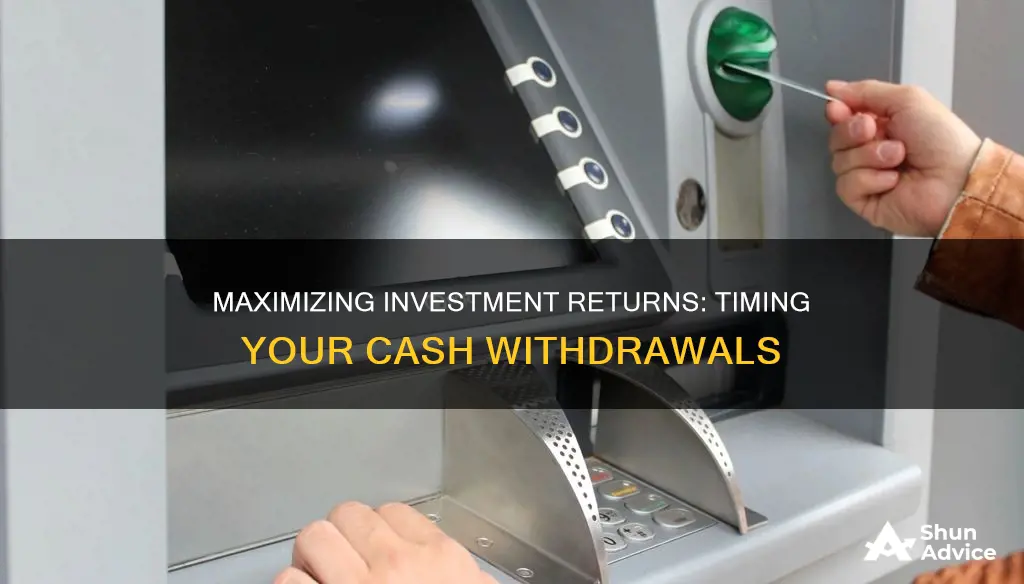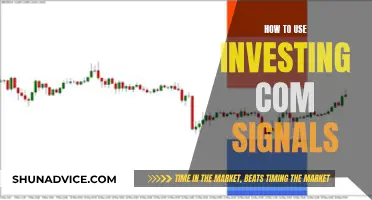
When to take cash from investments is a complex question that depends on a variety of factors. Firstly, it's important to remember that stock market investments are typically part of a long-term financial plan, and selling stocks prematurely could hinder your investment goals. Market timing, or attempting to sell before a market downturn, is challenging and rarely successful. Instead, investors are advised to stick to a long-term investing strategy and make regular contributions, even during market downturns.
There are, however, certain scenarios where withdrawing cash from investments may be necessary or beneficial. If you require money for an emergency or have achieved a specific financial goal, it may be prudent to withdraw funds. Additionally, as you approach retirement, you may need to start selling investments to fund your retirement plan. It's crucial to carefully consider your goals, budget, and overall financial strategy before making any withdrawals.
Furthermore, the tax implications of withdrawing cash from investments should not be overlooked. Selling stocks may result in capital gains taxes, and withdrawals from retirement accounts, such as traditional IRAs or 401(k)s, are typically subject to income tax. Early withdrawals from retirement accounts may also incur penalties unless they meet specific exceptions.
In summary, while there are valid reasons to take cash from investments, it is generally advisable to maintain a long-term perspective and avoid impulsive decisions based on short-term market fluctuations.
| Characteristics | Values |
|---|---|
| Time period | Investments should be held for at least five years, if not longer |
| Goals | Emergency funds, retirement, specific goals |
| Market timing | Difficult to move money in and out of stocks and get the timing right |
| Tax implications | Capital gains taxes, income tax |
| Age | Younger people can afford to take more risks with their investments |
| Risk | Cash investments are low-risk |
| Interest | Interest rates are low |
| Inflation | Inflation erodes the value of cash over time |
| Compounding | Compound interest maximises gains |
What You'll Learn

Weigh up short-term and long-term goals
Before deciding to withdraw money from your investments, it's important to consider your short-term and long-term financial goals. Ask yourself why you invested in the first place. Typically, stock market investments are intended as part of a long-term investment plan, meaning you shouldn't need to withdraw the money for at least five years, if not longer.
However, financial goals can change, so it's worth reassessing them periodically. For example, you may have started investing in stocks for retirement planning, but now you have a more immediate need for cash. In this case, selling stocks for cash could be detrimental to your long-term returns and may mean you don't meet your initial investment goals.
If you're unsure about your financial goals, it's a good idea to consult a financial advisor to help you decide whether to stick to your investment plan or withdraw cash.
It's also important to remember that withdrawing money from investments can have tax implications. Selling stocks for gains will require you to pay capital gains taxes, reducing your overall profit. On the other hand, selling investments for a loss may generate tax savings, but you'll be locking in those losses and won't be able to recover unless you reinvest at the right time.
Invest Cash Safely: Strategies for Secure Financial Growth
You may want to see also

Understand the tax implications
The tax implications of taking cash from investments depend on the type of investment and your individual circumstances. Here are some key points to consider:
- Capital gains tax: When you sell an investment, such as stocks, for a profit, you may be subject to capital gains tax. The rate you pay depends on how long you held the investment before selling. Long-term capital gains (assets held for more than a year) are typically taxed at lower rates than short-term capital gains.
- Dividend tax: Dividends are usually taxable income, and the rate depends on whether they are qualified or non-qualified. Qualified dividends are generally taxed at a lower rate than your regular income tax bracket.
- Tax-loss harvesting: You can offset capital gains with capital losses to reduce your tax liability. If you have more capital losses than gains in a year, you may be able to carry over the excess losses to offset future income.
- Retirement accounts: Traditional retirement accounts, such as 401(k)s and IRAs, have different tax treatments. With traditional accounts, you may be taxed on withdrawals in retirement. With Roth accounts, you pay taxes upfront, but qualified distributions in retirement are typically tax-free.
- Mutual funds: Investments in mutual funds may be subject to taxes on dividends, interest, and capital gains. Holding mutual fund shares inside a retirement account could defer these taxes.
- State and local taxes: Certain investments, such as municipal bonds, may be exempt from federal income tax but may be taxable on your state tax return, depending on the state you live in.
- Other taxes: In addition to income taxes, high-income individuals may be subject to additional taxes, such as the Net Investment Income Tax.
- Tax-advantaged investments: Some investments may have special tax treatments or exemptions. For example, contributions to a Roth IRA are made with after-tax dollars and generally grow tax-free.
Understanding Initial Cash Investment: First Steps for Entrepreneurs
You may want to see also

Know that market timing is difficult
Market timing is a strategy that attempts to predict the best times to buy and sell stocks to maximise returns and minimise losses. In theory, it sounds like a great idea, but in practice, it's incredibly difficult to get right.
The stock market is unpredictable, and even the most seasoned investors cannot accurately predict its movements. People often worry about recessions more than they actually happen, and stocks frequently turn positive before the economy actually improves following a downturn.
Trying to time the market can also be detrimental to your long-term investment goals. If you're constantly buying and selling, you may miss out on the benefits of compound interest, which can significantly increase your returns over time.
For example, let's say you invest $10,000 for 10 years with a net return of 7% (compounded annually). If you reinvest your returns each year, you'll end up with $21,049 at the end of the 10 years. However, if you withdraw the returns each year, you'll only end up with $17,000—a difference of $4,000!
Instead of trying to time the market, it's generally better to stick to a long-term investing strategy and make regular contributions to your retirement accounts. It's also important to remember that market downturns are a normal part of investing, and instead of trying to avoid them, you can take advantage of them by increasing your investments during these times.
As legendary investor Warren Buffett said, "The stock market is a device for transferring money from the impatient to the patient."
Fidelity's Cash Management Account: A Smart Investment Move?
You may want to see also

Explore alternatives to holding cash
If you're looking for alternatives to holding cash, there are a few options to consider. These alternatives can provide higher returns than traditional savings accounts and help you diversify your portfolio. Here are some options to explore:
- Defensive stocks: Shifting your portfolio towards defensive sectors, such as consumer staples or utilities, can be a good option during a recession. These industries tend to be less affected by economic downturns and can provide more stability for your investments.
- Asset allocation changes: Consider reevaluating your overall asset allocation. If you're uncomfortable with your current level of stock holdings, you can increase your exposure to bonds or explore other assets like real estate through real estate investment trusts (REITs).
- Portfolio rebalancing: Regularly rebalancing your portfolio can help you take advantage of market downturns. When stocks fall, the percentage of your portfolio allocated to stocks decreases. By rebalancing, you can buy more stocks at lower prices without moving to cash.
- High-yield savings accounts: These accounts offer higher interest rates than traditional savings accounts, allowing your money to grow faster while maintaining liquidity and security. They are a good option if you're looking for a place to park your cash temporarily while still earning returns.
- Money market mutual funds: These funds provide higher yields than traditional savings accounts and maintain a stable value of $1 per share. They offer high liquidity and low risk, making them a smart option for parking cash intended for future investments. However, it's important to monitor interest rate fluctuations and be prepared to transfer funds when needed.
- Treasury bills (T-bills): T-bills are short-term government securities known for their safety and higher yields compared to traditional savings accounts. Backed by the US government, they offer a range of maturities, from a few days to 52 weeks, providing flexible investment durations.
- Short-term bonds or bond funds: These offer higher yields than bank savings accounts but come with some principal risk. The value of these bonds can fluctuate based on market interest rates. Holding individual bonds until maturity ensures the return of your initial investment plus interest payments.
- Certificates of Deposit (CDs): CDs are offered by banks and financial institutions, providing higher interest rates in exchange for keeping your money invested for a specific period, usually ranging from 3 months to 5 years. The longer the investment duration, the higher the return. However, early withdrawal may incur penalties, reducing liquidity.
- Treasury Inflation-Protected Securities (TIPS): TIPS are designed to protect your investment from inflation. The interest rate is fixed at the time of purchase, and the principal value adjusts based on inflation rates. At maturity, you receive the higher of the original or inflation-adjusted principal.
- Alternative investments: These include investments such as cryptocurrencies, private equity, real estate, commodities, precious metals, and art. They tend to carry more risk and may be less liquid, but they can provide diversification and the potential for higher returns.
Investing Activities: Statement of Cash Flows Impact
You may want to see also

Be aware of the opportunity cost of holding cash
Holding cash can be a comforting thought for many investors, especially during volatile market conditions. However, it is important to be aware of the opportunity cost associated with this decision. Opportunity cost refers to the benefits that could have been gained by choosing one alternative over another. In the context of cash holdings, the opportunity cost is the potential gain in the stock market that is missed by taking money out of the market.
The stock market has historically been the better bet for investment returns compared to cash holdings. By keeping your money in cash, you are not only forgoing the potential gains in the stock market but also losing purchasing power over time due to inflation. Cash does not grow in value, and its purchasing power erodes as inflation nibbles away at it. Therefore, holding cash over the long term is unlikely to be a wise strategy.
Consider the example of an investor who decides to invest $10,000 for ten years with a net return of 7% (compounded annually). If the investor chooses to reinvest the interest earned, the investment grows to $21,049. On the other hand, if the investor withdraws the interest of $700 each year, they would have only $17,000 at the end of the ten-year period. This example illustrates the power of compounding interest and the opportunity cost of not keeping your money invested.
It is also important to remember that market timing, or trying to predict the right time to get in or out of the stock market, is notoriously difficult and has not proven to be a successful investment approach over the long term. Instead of trying to time the market, investors are generally better off staying invested and adopting a long-term perspective.
In conclusion, while holding cash may provide a sense of security and help avoid short-term market volatility, investors should be mindful of the opportunity cost involved. The potential gains in the stock market, along with the eroding effect of inflation on cash holdings, should be carefully considered before deciding to take cash out of the market.
Equity Investment Strategies: Cashing Out Startups Explained
You may want to see also
Frequently asked questions
While it may be tempting to take your money out of the stock market and hold it as cash, especially during volatile periods, doing so is unlikely to be a wise move over the long term. Cash doesn't grow in value and is impacted by inflation, which erodes its purchasing power over time.
Holding cash can help you avoid losses in a falling stock market. It is also psychologically soothing to have cash on hand or in your bank account during troubled times.
Holding cash means missing out on the potential gains of staying invested in the stock market. Over time, the opportunity cost of forgoing these gains is likely to outweigh the benefits of holding cash.
It is generally recommended to only withdraw cash from your investments if you need money for an emergency or if you have achieved a specific financial goal. Withdrawing cash from retirement accounts, in particular, can have tax implications and early withdrawal penalties.







